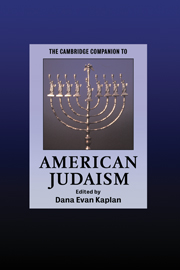Book contents
- Frontmatter
- Introduction
- Part I Historical overviews
- Part II Themes and concepts
- Section 1 Religious Culture and Institutional Practice
- Section 2 Identity and Community
- Section 3 Living in America
- 15 The American Jewish urban experience
- 16 "Sacred Survivial”revisited: American Jewish civil religion in the new millennium
- 17 Judaism and democracy in America
- 18 The economics of American Judaism
- 19 American Judaism and interfaith dialogue
- Section 4 Jewish Art in America
- Section 5 The Future
- Afterword
- Further reading
- Index
- Series list
16 - "Sacred Survivial”revisited: American Jewish civil religion in the new millennium
from Section 3 - Living in America
Published online by Cambridge University Press: 28 May 2006
- Frontmatter
- Introduction
- Part I Historical overviews
- Part II Themes and concepts
- Section 1 Religious Culture and Institutional Practice
- Section 2 Identity and Community
- Section 3 Living in America
- 15 The American Jewish urban experience
- 16 "Sacred Survivial”revisited: American Jewish civil religion in the new millennium
- 17 Judaism and democracy in America
- 18 The economics of American Judaism
- 19 American Judaism and interfaith dialogue
- Section 4 Jewish Art in America
- Section 5 The Future
- Afterword
- Further reading
- Index
- Series list
Summary
Among the questions posed by sociologists of American Jewry, there is one that is perennial and basic but that has always seemed to elude easy answer: What is the content of American Jews’ “Jewishness”? What beliefs and behaviors, self-understandings and commitments do Jews embrace as a consequence of being Jewish?
Writing from the vantage point of the early 1980s, I suggested that, for a large number of American Jews, and especially for those most active in the institutional structures of the American Jewish community, many of the answers to these questions were provided by what I called an American Jewish “civil religion.” This civil religion defined a way of being Jewish that enabled its adherents to give meaning to their identities as Jews by connecting them to a great historic drama of destruction and rebirth. Such Jews made the survival of the Jewish people their sacred cause. They supported Israel and marched to free Soviet Jews. They gave generously to philanthropies in order to express their solidarity with fellow Jews and their commitment to the Jewish value of tzedakah (philanthropy and social justice). They educated their children as Jews, and they gathered at key points during their lives and during the year to publicly acknowledge and celebrate their Jewishness and their attachment to Jewish tradition. They celebrated as well their success as Americans, always wary of anti-Semitism, but feeling that in America they had found a congenial home, not just another way station in a long journey. With mostly good humor, these Jews accepted the fact that, when it came to theology and observance of Jewish law, two Jews meant three opinions.
- Type
- Chapter
- Information
- The Cambridge Companion to American Judaism , pp. 283 - 298Publisher: Cambridge University PressPrint publication year: 2005
- 4
- Cited by



